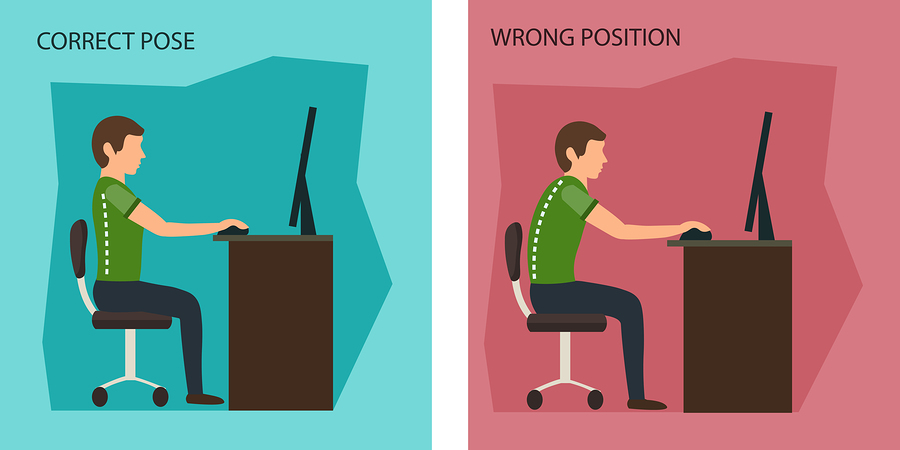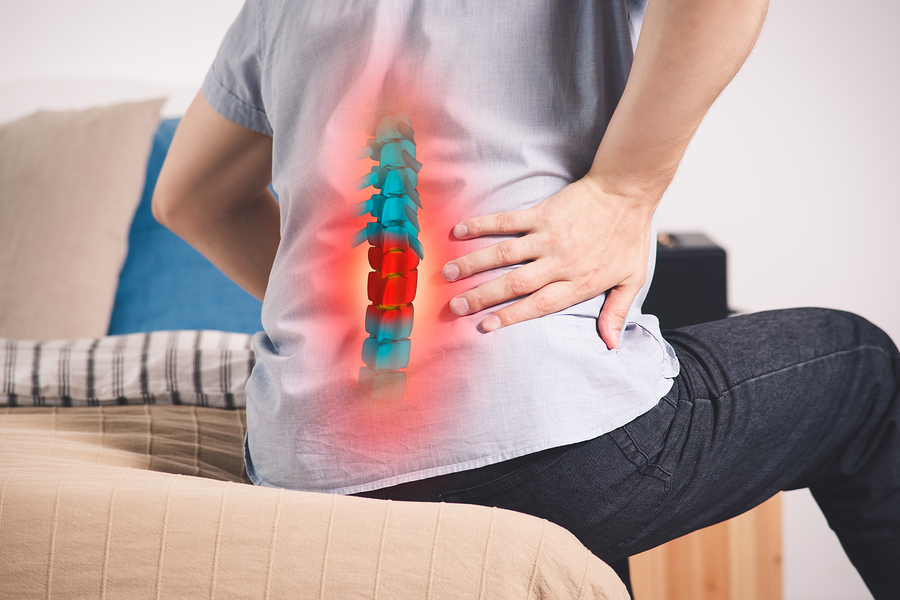How to cope with minor aches and pains
Dodgy back, aching knees, trapped nerves…Sound familiar? It happens to us all sooner or later but there are things we can do to help ourselves
Troublesome niggles can affect our mood, mobility and all aspects of our lives. It is interesting to note that most causes of joint pain happen when we are overdoing everyday activities such as digging in the garden or lifting heavy bags rather than whilst we are exercising.
So how to cope with those minor aches and pains? Jan Vickery, lead physiotherapist and her team at AXA PPP healthcare takes us through some of the more common ailments:
If I’m working at my desk I find that by the end of the day I have stiff ankles and achy knees. Why does this happen?
Ankles and knees tend to stiffen up after they have been in the same position for long periods, especially as we get older. So if you have a desk-based job then it’s really important to keep moving. If you tend to forget to take a break then try and drink plenty of water so you will have to leave your desk to go to the toilet, or perhaps move your printer further away so forcing you to get up and walk to it. You could also invest in a stress ball on the floor which you move with your feet or simply remember to keep fidgeting! All and any movement is good and it is recommended to move every 20 minutes.
However, it may be worth making an appointment with your GP if you feel your stiffness is not linked to sitting still for long periods or it is markedly worse in the morning.
I am worried that I am not sitting correctly as I suffer from middle back pain, at either side of my spine. What can I do to help myself?
More often than not aches and pains in our spine are due to bad posture or not moving in the correct way. Try not to slouch – maintaining good posture throughout the day is very important for our bodies. If you are desk-based then your chair should support your spine in an ‘S’ shape. It should have good lumbar support (lower back) and you should help yourself by regularly moving out of your chair too. It is also a good idea to check that your desk is set up correctly – your monitor should be at eye level so you don’t bend your head, chair at a height so your feet are firmly on the floor and desk not too high or too low. If you have to use your laptop, try a laptop raise and don’t balance it on your knees.

Here are some simple exercises that can be done throughout the day:
- Stand and stretch backwards with your hands in the small of your back or bend from side to side
- You can help your upper body by turning your head from side to side slowly, looking up then down, shrugging your shoulders or rolling them and stretching both arms up into the air.
- A tummy tuck exercise (holding your lower abdominal muscles for a few seconds) should strengthen your core and so help with your posture too.
If you feel your pain is not settling, however, then it is worth getting checked out by a physiotherapist or your GP.
I have been told I have polymyalgia and my GP has prescribed steroids. Can you explain what it is and can I help my condition in a more natural way?
The main symptom of polymyalgia rheumatic is muscle stiffness in the mornings, usually lasting longer than 45 minutes. The condition is fairly common and can cause pain, and inflammation in the shoulders, neck and hips. It is not known what causes polymyalgia rheumatic but it is thought to be a combination of genetics and environment.
As this is an inflammatory condition gentle exercise such as swimming or tai chi can be helpful as they will aid flexibility, posture and strength but often it is necessary to take medication. It is sometimes possible to manage with a short dose of steroids to get things under control and then maintain the condition with a reduced dose but we recommend that you discuss this with your GP as you are concerned about the long term side effects of your medication.
When I drive for long periods I get a stiff neck. Is there anything I can do?
It is important to stop every hour or so when you are driving long distances. When you do stop, make sure it is a safe place, get out of the car and walk around for a few minutes. The stretching exercises as detailed above will certainly help and remember try not to slouch as you drive as this may result in back pain too.
There is a hot patch just above my knee. What could it be and what can I do about it?
If there is no swelling, redness or heat radiating from the hot patch then it could be nerve related. Try and make sure that you’re not crossing your legs for long periods or leaning anything on your leg. If the patch is there when you are standing then change your position or walk around. If none of this advice helps then it is important to get it checked over by your GP or a health professional.
Any advice on how to un-trap a nerve in my little finger?
Regularly massaging the finger will stimulate the nerve and circulation. Try not to lean on it or on your elbow as this may contribute to the numbness.
Sometimes these symptoms can come from your neck so try turning your head right and left a few times an hour. If it does not improve within a month then seek further advice from your GP.
I seem to have an ache in a different place every day! Is this just because I’m getting older?
Unfortunately, we do tend to get more aches and pains as we age and the best plan is to keep moving and take gentle exercise.
That said, however, your pain may be related to an activity you have been doing. If you think this is the case then it may be helpful to keep an activity log and monitor if certain things you do make the pain worse.
As with any pain, however, if you are at all worried or if the same pain has been occurring for more than a few weeks then make an appointment with your GP to get it checked out.
I have arthritic knees but still want to exercise. How can I protect them from becoming too painful?
Excessive loading of our body means that our knees take the brunt. So when you are exercising do bear in mind the following tips:
- Make sure you are wearing good supportive trainers which will take some of the impact, especially if you are out running
- When cycling, ensure your seat is properly adjusted to your height
- If you weight train then don’t use weights that are too heavy as this will put too much pressure on your joints
- Make sure your knees do not go over your toes if you are doing squats or lunges
I have pain and stiffness in my fingers and have been diagnosed with osteoarthritis. My GP prescribed diclofenac 6 months ago but it hasn’t helped. What should I do?
First and foremost if there has not been any improvement in your condition then we suggest you go back and see your GP. A different type of medication may be prescribed or you may be referred for physiotherapy.
As there are a number of methods which may relieve your symptoms – such as specific exercises, heat, cold or therapeutic wax – a medical professional can help you to find the best method for you.
My GP tells me that I have tendonitis in both my feet. Are there any specific stretching exercises I should do to help?
Stretching the tendons may not necessarily be the way to ease your symptoms – wearing insoles in your shoes could help enormously. We suggest an appointment with a physiotherapist or podiatrist as they could help by undertaking a full assessment – there may be several reasons why you have tendonitis such as the way you stand, your shoes, or muscle weakness and a specialist will help you to find out and advise on the best course of action for you.
In the meantime, if you wear high heels it’s best to avoid them. Discover the reasons why you should limit wearing heels
I think I may have tennis elbow because the muscle in my arm aches
If the muscles on the outside of your elbow are aching and you can’t bend your wrist upwards without pain then it could be tennis elbow. People suffering with tennis elbow describe holding a cup of tea as being very difficult.
If you rest the arm or moderate the activity that provokes your symptoms then tennis elbow will get better on its own. If you are concerned that your symptoms are just too painful or not going away by themselves then see your GP as they may refer you to a physiotherapist who should be able to advise you.
A visit to our Musculoskeletal Centre will give you more information about muscles, bones and joints along with advice on joint and back pain.
Disclaimer
All content on Silversurfers.com is provided for general information only, and should not be treated at all as a substitute for the medical advice of your own doctor or any other health care professional. Silversurfers will not be responsible or liable for any diagnosis made by a user based on the content on www.silversurfers.com and we are also not liable for the content of any external websites or links from or to Silversurfers to any other websites. Please always consult your own doctor if you’re in any way concerned about any aspect of your health
Melina - Assistant Editor
Latest posts by Melina - Assistant Editor (see all)
- Top tips for hay fever sufferers - April 14, 2024
- Paysan Breton Cream Cheese Breakfast Wraps - April 12, 2024
- 4 Homemade Sweet Treats for Easter - March 24, 2024
- Playground Memories - March 10, 2024
- The invasion of the duvet: the ’10-second bed’ - February 20, 2024





















